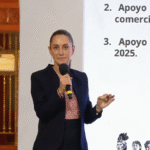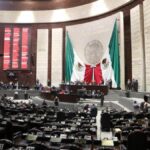Introduction
As Mexican residents prepare to vote in the country’s first-ever judicial elections next month, two controversial figures have made it onto the ballot for federal judge positions despite their past legal troubles. The ongoing debate surrounding these candidates has raised serious questions about the future of the rule of law in Mexico.
Candidates with Questionable Backgrounds
Leopoldo Chávez
Leopoldo Chávez, who served nearly six years in a U.S. prison for drug-related offenses including the trafficking of over four kilograms of methamphetamines in 2015, is running for a federal judge position in Durango. This state is part of Mexico’s Golden Triangle, a region controlled by cartels where marijuana and poppy cultivation thrive.
Chávez acknowledged his past conviction in a Facebook video, stating he had served his sentence and had nothing to hide. He declined further comment to Reuters.
Francisco Hernández
In neighboring Jalisco, Francisco Hernández is campaigning for a position as a penal magistrate despite being previously removed from his role as a federal judge following an investigation into sexual abuse and corruption allegations.
Hernández dismissed the accusations as “calumnies and defamation,” stating, “Let the people judge me.”
Fernando Escamilla
Fernando Escamilla, a candidate for federal penal judge in Nuevo León, argues that his past legal work advising attorneys for members of the ultra-violent Zetas cartel should not be held against him. His expertise in extradition law, which he applied to advise drug lords, he believes demonstrates his competence and knowledge.
Judicial Reform and Its Critics
The controversial judicial reform, proposed by former leftist president Andrés Manuel López Obrador and supported by current President Claudia Sheinbaum, aims to eliminate corruption in Mexico’s flawed judicial system and allow the public to choose their judges.
Approximately 5,000 candidates are vying for over 840 federal positions, including all Supreme Court of Justice (SCJ) justices.
However, less than a week before the June 1 election, civil rights organization Defensorxs claims to have identified around twenty candidates with criminal backgrounds, corruption accusations, or past ties to cartels. Among them is a lawyer who represented Joaquín “El Chapo” Guzmán, a notorious drug trafficker.
The non-profit Observatorio Electoral Judicial (OEJ) has also flagged over 130 candidates with high chances of winning without opposition, criticizing the complex ballot design that may confuse voters.
Concerns Over the Reform
The reform, approved in September 2024, has been criticized by former U.S. Ambassador Ken Salazar as a threat to Mexican democracy.
Critics argue that the reform, one of the broadest attempted in recent years in the Western Hemisphere, risks eliminating checks on the ruling party, Morena, and allowing criminal organizations greater influence over the judicial system.
The reform reduces SCJ ministers from 11 to 9, shortens their terms to 12 years, removes the minimum age requirement of 35, and cuts in half the required five years of legal practice.
It also eliminates certain worker benefits and establishes a five-person disciplinary tribunal, deemed insufficient to oversee a 50,000-member judicial branch.
Defensorxs’ Allegations
Defensorxs President Miguel Meza claims that the organization has identified several problematic candidates, revealing significant flaws in the government’s background investigation process designed to verify eligibility criteria such as Mexican citizenship by birth, law degree, good reputation, and a clean criminal record.
Meza stated that aspiring judges were not thoroughly investigated to confirm foreign convictions or past legal representation.
He attributes much of the issue to the rushed election timeline.
Candidate Responses
Silvia Delgado
Silvia Delgado, who represented Joaquín “El Chapo” Guzmán in 2016, is a frontrunner candidate for penal judge in Chihuahua.
Delgado, a single mother and law graduate, asserts her integrity and dedication to defending people throughout her life.
She maintains that her representation of “El Chapo,” including petitioning for his prison comforts, aligns with her professional obligations.
Delgado admits she took the case due to its high-profile nature and curriculum value, denying any post-case contact with “El Chapo”‘s attorneys but confirming her assistance to his binational wife in transporting their daughters to the U.S.
She criticized Meza and Defensorxs, calling them “irresponsible” and likening their actions to those of Robin Hood, directly targeting her.
Meza clarified that Defensorxs aims to inform the public about candidate risks rather than attack individuals.
Media War and Election Integrity
Senator Gerardo Fernández Noroña, a powerful member of the ruling party, dismissed concerns over candidate eligibility as a “racist and classist” media war intended to discredit the elections.
He emphasized that ineligible candidates could be removed after the vote.
However, the electoral authority, the INE, has stated that names cannot be removed before the election.
INE consejera Claudia Zavala stressed that the INE should have been involved earlier in the candidate vetting process, which was conducted by a committee selected by Congress, the Judicial Power, and the Executive Power.
Zavala explained that the INE can only review complaints after the election to prove a candidate’s ineligibility, with the position going to the runner-up if necessary.
She emphasized that any investigation into a candidate’s eligibility must be completed before June 15, when election results are finalized and positions are confirmed.
“The evidence must be very clear,” Zavala stressed.






